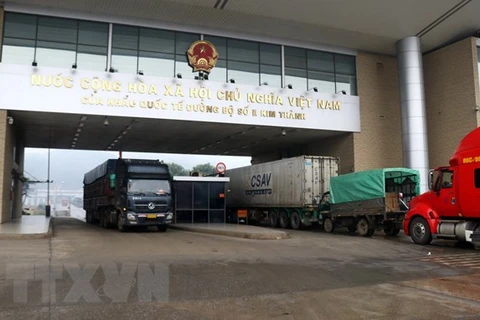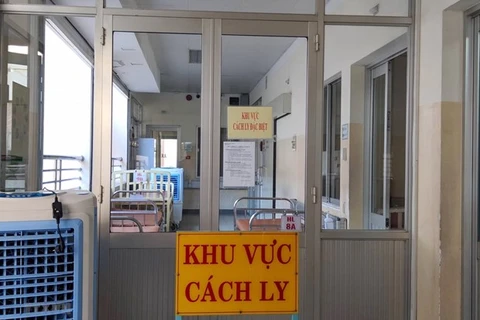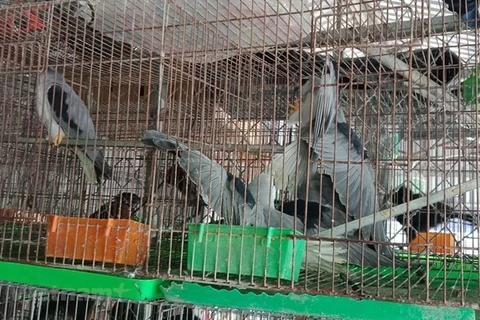Hanoi (VNA) – Efforts should be ratcheted up to prevent the spread of the COVID-19 pandemic among vulnerable groups, Deputy Minister of Health Nguyen Truong Son has said.
These groups, as well as patients in serious conditions who are under treatment at hospitals, the elderly and patients with underlying chronic diseases like diabetes and kidney failure, are at the high risk of COVID-19 infections, Son told the press.
COVID-19 cases must be detected early, monitored and treated as soon as possible in order to contain the operation of the coronavirus inside the patient body, and complications of underlying chronic diseases or COVID-19 like the case of Patient 91.
According to the Deputy Minister, the successful treatment of Patient 91, a British pilot, is a miracle recorded by the domestic health sector. However, the conditions of Patient 91 and other severe COVID-19 cases in the central city of Da Nang are different.
The Da Nang patients have suffered from long-term, serious underlying health conditions that lead to complications such as heart and kidney failures, and debilitating symptoms.
Therefore, Son said, it is hard to treat these patients whose immune system has weakened although doctors have made all-out efforts.
He said hemodialysis patients are at the higher risk of fatality. Besides, such complications as heart and multiple-organ failures that have affected the functions of liver and the respiratory system would make it easier for the virus to attack the patients. Some of them have died of the complications.
The COVID-19 treatment regimen has been adjusted for six times so far, Son said, adding that each case requires consultations of experts and doctors from hospitals and agencies.
As of 18:00 on August 13, Vietnam had reported 905 COVID-19 cases, including 20 fatalities.
Among the total infections, 438 are linked to the outbreak in Da Nang since July 25.
The number of imported cases is 327 that were quarantined right upon entry.
Vietnam confirmed the first case of COVID-19 community transmission after 99 days on July 25. The patient, known as Patient 416, is a 57-year-old man who lives in the central city's Lien Chieu district.
Patient 91 boarded a flight from Ho Chi Minh City to Hanoi on July 12, where he then took another flight to the UK from Noi Bai International Airport at 11pm the same day, after 115 days undergoing treatment.
During April and May, his condition deteriorated dangerously to a point where only 10 percent of his lungs could function properly and he had to be put on life support for most of his treatment at HCM City for Tropical Diseases.
A lung transplant was once considered but thanks to Vietnamese doctors’ efforts and determination to save his life, it was deemed no longer necessary.
The patient has not needed life support since June 3 and came off the ventilator nine days later.
During phone talks with Vietnamese Deputy Prime Minister and Foreign Minister Pham Binh Minh on July 13, British Foreign Secretary Dominic Raab congratulated Vietnam on its success in containing the COVID-19 pandemic, and thanked Vietnamese competent agencies and doctors for their dedication in treating the British pilot.
On August 12, Vietnamese and US experts and doctors shared experience in treating patients with end-stage chronic kidney failure amid the COVID-19 outbreaks, as most of the COVID-19 deaths in Vietnam are related to this disease.
The video conference was jointly held by the Health Ministry and the Vietnamese Embassy in the US, with the participation of Deputy Health Minister Tran Van Thuan, Director of the Health Ministry’s Department of Medical Examination and Treatment Luong Ngoc Khue, leaders and heads of several central-level hospitals’ renal departments, and US Secretary of Health and Human Services Alex Azar.
Speaking at the event, Thuan said statistics and scientific evidence show that in the world and in Vietnam in particular, the elderly and those with chronic diseases, especially end-stage chronic kidney failure, have been affected the most by the COVID-19 pandemic.
The implementation of the social distancing and COVID-19 prevention and control measures has been a challenge for kidney care services such as dialysis and peritoneal dialysis at medical clinics, he added.
Foreign experts advised Vietnam to conduct peritoneal dialysis at home to minimise the risk of infection at hospitals.
Vietnam was also recommended to consider using automatic peritoneal dialysis with remote prescription function to treat patients with artificial kidneys, which is an effective method the US is applying./.

























